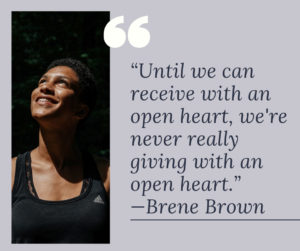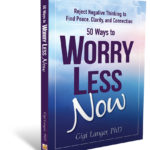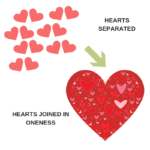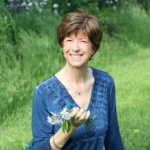 How easily can you receive care from from others? This question stopped me in my tracks when I read it in The Answer Is Simple: Love Yourself, Live Your Spirit! by spiritual teacher Sonia Choquette.
How easily can you receive care from from others? This question stopped me in my tracks when I read it in The Answer Is Simple: Love Yourself, Live Your Spirit! by spiritual teacher Sonia Choquette.
Surely, I thought, that wasn’t a problem for me! I had allowed plenty of men to “take care” of me–but only when I was in control of the payoff. The rest of the time, I was fiercely self-sufficient.
When I considered that I could receive care from other people, with NO strings attached, I could barely fathom it. I had always felt church and other organizations only welcomed me because they wanted my money or time.
Further, I didn’t feel I deserved such generous attention. My alcoholic home had taught me I wasn’t worth someone’s care or love; and that being a care-giver was safer than expecting it from another.
So, it’s not surprising that when I first went to 12-step programs, I was hesitant to accept the support offered by others–especially the women! Up until then, I had always relied on my lover and one female “using buddy.” I had no idea how to interact with healthy women without my old manipulative ways.
But, after months of hearing my recovering friends talk about their loving sponsors, I finally took the plunge and asked someone to be my sponsor. I couldn’t believe it when she said yes and gave me hours and hours of her undivided attention, just so I could stay sober (and she stayed sober too!)
It’s almost impossible to grow spiritually without healthy friends whose main purpose is to do the same. So, if you’re trying to straighten out your life (or keep it sane), you’ll consider this question carefully:
** How willing are you to receive help from others? **
It took me a while, but I’m happy to report that I now count myself rich, knowing that a select group of friends would immediately come to my rescue in any crisis.
To examine your own willingness to receive care from others, take a moment to consider these questions.
1. How easy is it for you to ask others for help?
2. Do you believe you always need to appear strong and competent?
3. Are you most comfortable in the role of helping others?
4. Can you graciously accept healthy loving care regardless of where it comes from?
5. What false beliefs might stand in the way of you being a better receiver?
If you can’t trust others to give you love without expecting something in return, or if you believe you don’t deserve others’ support, I encourage you to let go of this “I am an island” mentality (as in Paul Simon’s song, “I am a rock”). Perhaps counseling, spiritual practices, or other healthy people can help you accept loving care from others.
For tips on finding healthy friends, read this article. To learn more about overcoming negative, self-limiting thinking so you can enjoy peace, clarity, and connection, see GigiLanger.com.
 Gigi Langer holds a PhD in Psychological Studies in Education from Stanford University. She’s a sought-after speaker and retreat leader who has helped thousands improve their lives at work and at home.
Gigi Langer holds a PhD in Psychological Studies in Education from Stanford University. She’s a sought-after speaker and retreat leader who has helped thousands improve their lives at work and at home.
 Order her award-winning book, 50 Ways to Worry Less Now at Amazon or get 20% off with promo code 20lessnow here.
Order her award-winning book, 50 Ways to Worry Less Now at Amazon or get 20% off with promo code 20lessnow here.


 I’m currently in the Facebook penalty box. Have been for almost a week. It’s the second time this month. And, guess what?! I’m miserable because I miss connecting with my Facebook friends.
I’m currently in the Facebook penalty box. Have been for almost a week. It’s the second time this month. And, guess what?! I’m miserable because I miss connecting with my Facebook friends.